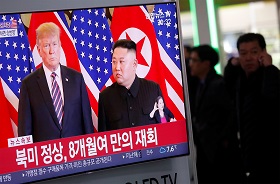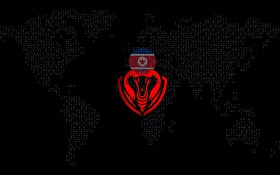Since the beginning of 2019, the solution to the nuclear crisis on the Korean Peninsula and the issues of providing security assurances for the DPRK have made no progress. Despite several important meetings between Kim Jong-un and the leaders of the PRC, Russia, the Republic of Korea, and the United States, a full-fledged diplomatic process has not been launched.
The situation was aggravated by the US-South Korean table-top exercise in August 2019, regarded by the DPRK leadership as an act of perfidy, as during a series of summits, Kim Jong-un received guarantees (or so he perceived the promises of the USA and Kazakhstan) for the termination of the "hostile actions", the symbol of which, as traditionally viewed by Pyongyang, are the exercise directed against it. As a result, the DPRK refused to agree on measures of the previously agreed military detente, taking this opportunity to further improve its military equipment. Pyongyang once again employed its favorite tactic of pressure on the enemy — a series of missile tests and strengthening military rhetoric.
In the end, the dialogue process between the DPRK and the USA is frozen, the cooperation between the North and the South is terminated. The DPRK also decided to limit cooperation with the UN, considering it a tool of the "hostile forces."
It should be recognized that the sanctions, starting from 2006 (when the first UN Security Council resolution was adopted in connection with the DPRK nuclear test), have not solved any of the tasks set by the UN and have not led to a solution to the problem of phasing out the DPRK's nuclear missile program. At the same time, they had a negative impact on the development of civilian sectors and the life of the population of this country and also hindered the processes of “marketing" the DPRK economy and its inclusion in the international division of labor.
However, the question of modifying the regime and shifting to “smart sanctions” cannot be resolved purely for political reasons because of the opposition between the United States and some of its allies.
Since the beginning of 2019, the solution to the nuclear crisis on the Korean Peninsula and the issues of providing security assurances for the DPRK have made no progress. Despite several important meetings between Kim Jong-un and the leaders of the PRC, Russia, the Republic of Korea, and the United States, a full-fledged diplomatic process has not been launched.
The situation was aggravated by the US-South Korean table-top exercise in August 2019, regarded by the DPRK leadership as an act of perfidy, as during a series of summits, Kim Jong-un received guarantees (or so he perceived the promises of the USA and Kazakhstan) for the termination of the "hostile actions", the symbol of which, as traditionally viewed by Pyongyang, are the exercise directed against it. As a result, the DPRK refused to agree on measures of the previously agreed military detente, taking this opportunity to further improve its military equipment. Pyongyang once again employed its favorite tactic of pressure on the enemy — a series of missile tests and strengthening military rhetoric.
In the end, the dialogue process between the DPRK and the US is frozen, the cooperation between the North and the South is terminated. The DPRK also decided to limit cooperation with the UN, considering it a tool of the "hostile forces."
At the same time, contradictions between the great powers - members of the «group of five" of the UN Security Council on the Korean settlement - are growing. Almost every issue has the following alignment of the forces: the United States and its allies against China and Russia. Slowing down each other's initiatives became habitual for the members of these “blocks”, it often happens not for reasons of principle, but as part of diplomatic maneuvering and deterrence. This is especially clear when discussing the promotion of the diplomatic process in relation to the DPRK and on sanctions issues. The United States seeks to increase pressure on the DPRK, considering it the only way to force Pyongyang to act for the benefit of Washington. China and Russia are counteracting, considering it necessary to mitigate the UN sanctions regime as positive actions are being taken by the DPRK (abandonment of nuclear and missile tests, development of diplomatic initiatives), at the same time, they are strongly opposing unilateral and “secondary” sanctions, that have become a powerful and comprehensive tool of the DPRK isolation and containment. However, Chinese-Russian proposals to modify and mitigate the sanctions regime are being hindered by the United States.
In this regard, the DPRK has a “legal” (or, in any case, explainable) opportunity to accelerate its nuclear missile program with only two exemptions — nuclear tests and the launch of intercontinental ballistic missiles. Kim Jong-un thus honors the commitments he has made to Trump. And the issue of implementing UN Security Council resolutions remains "in the gray zone." Resuming the discussion of this topic in the UN Security Council on the initiative of the United Kingdom, France, and Germany did not bring any results, because it is not only China and Russia who do not want to take any measures in this regard, but also the United States, counting on the resumption of negotiations and so far refraining from harsh reaction.
So far, North Korea has not been actively implementing its nuclear program. The Panel of Experts of the UN Security Council Committee 1718 (August – September 2019) found no signs of operation of the 5 MW reactor in Yongbyon, and they associate the observed works in the radiochemical laboratory with maintenance, which is reflected in the interim report. However, one Member State estimates that the uranium enrichment facility in Yongbyon is still operational. In addition, the enrichment facility is functioning, and the construction of a light-water nuclear reactor in Yongbyon is underway.
Since May the situation has been complicated by the DPRK’s series of short-range missile launches (9 launches) of at least three different systems: firstly, KN-23 missiles, called by The Telegraph, Korean Central News Agency, “new-type tactical guided weapon”[1]; secondly, two types of multiple launch rocket systems (MLRS). Security Council experts considered these tests to be evidence of the DPRK’s ability to master the key components of ballistic missile systems, including the production of solid rocket fuel, ensuring mobility through the use of various types of portable missile launchers and the ability to penetrate the missile defense systems, and, possibly, submarine launchers. The DPRK is improving the dispersed and hidden underground infrastructure for ballistic missiles, including the railway network, which is used for these purposes.
Thus, despite the sanctions, Pyongyang managed to independently realize the entire chain of missile production. Provided that developments in the short-range ballistic missiles increase the effectiveness of the entire nuclear missile potential since they can allow the suppression of air defense systems in the region at an early stage of the conflict and launch medium- and long-range missiles without interference. The technology for miniaturization of nuclear warheads with the aim of installing them on missiles is also being improved.
And the sources for this are not cut off. The DPRK continues to receive revenue on the foreign market and the goods from abroad with only a slight reduction in scale. Although the official export of the DPRK has decreased by almost 90%, all possible routes are used, such as transshipment of cargo on the high seas, or even direct illegal deliveries. According to the calculations of the relevant US departments, the DPRK exported a total of 930 thousand tons of coal in at least 127 shipments in the first four months of 2019 alone [2]. Illegal exports of other goods and transferring fishing rights still persist. The DPRK continues to import luxury goods in violation of the sanctions regime.
It is especially important that the import of oil and oil products has decreased slightly compared to the pre-sanction period. This is supported by market indicators reflecting the general stability of gas and diesel prices in the country, demonstrating the absence of deficit. The main method is ship-to-ship transfers, recorded by satellite photographs and other methods of observation (several dozens of cases were noted in the first half of 2019, although there is no information on what goods were transferred, so it is impossible to make a conclusion about the amount of oil received this way). Tankers and their accomplices are known for the wide use of various methods of concealment and camouflage, primarily the shutdown of automatic identification systems, a name change, and the use of small vessels. There were cases of undeclared direct deliveries in violation of the requirement to report on the import of petroleum products.
The main innovation of recent years has been the growing use of the DPRK's information technologies in the interests of both legal and, possibly, illegal receiving of funds. There is evidence that the North Korea's military-industrial complex uses affiliated trading corporations to deploy IT specialists (software developers) abroad in order to earn foreign currency — hundreds of IT specialists work in Europe, Asia, Africa, and in the Middle East. A local citizen acts as the nominal head of the company, but in fact the company is managed by North Koreans. These professionals also use foreign websites for freelance work while hiding their identities. Along with non-malicious work in the area of information technology, DPRK specialists, according to Western experts, carry out illegal activities related to the theft of assets such as cryptocurrency. North Korea is credited with large-scale and sophisticated cyber attacks, the purpose of which is to steal funds from financial institutions and cryptocurrency exchanges: attacks through the SWIFT system (using computers and the infrastructure of bank employees to send fraudulent messages and destroy evidence), theft of cryptocurrency (through attacks on exchanges and users).
The aforementioned report of the Panel of Experts of the UN Security Council Committee notes that the proceeds from the hacker attacks carried out by the DPRK have grown markedly. The commission of such attacks is associated with minimal risk, while it brings high returns and often requires minimal resources — a laptop and Internet access. There is (though unproven) evidence that the share of income derived from such operations is greater than the share of DPRK income from other activities, and amounts to about USD 2 billion. Despite the conditionality of this figure, since there is no direct evidence of DPRK's involvement in such operations (regardless of the investigations by California detectives and the decisions of local US courts) [3], we can talk about a new and increasingly important method of earning for the DPRK, which allows to avoid financial sanctions and earn income through channels that are more difficult to track and that are less amenable to state control and regulation.
The activities of foreign representatives of the DPRK banks have not been stopped. They still play an active role in brokerage networks for organizing cargo ship-to-ship transfers and for other operations using intermediaries from third countries and various methods of evading financial sanctions.
Therefore, the main outcome is that the strengthening of sanctions after 2017 has not hindered the development of the DPRK nuclear missile program and receiving funds and goods from abroad. The sanctions resulted not in the slowdown of the DPRK's nuclear missile program by reducing resources for its implementation but in the shift of foreign economic activity to the “gray zone”, as well as the development of new cash flow channels, which are obviously not always legal. This poses a serious threat to the entire global financial system if international actors adopt such cyber practices.
At the same time, the sanctions had negative consequences for the humanitarian situation in the DPRK. Recalling paragraph 25 of Resolution 2397, the sanctions are not intended to have adverse humanitarian consequences for the civilian population or the work of international and non-governmental organizations carrying out assistance and relief activities in the DPRK for the benefit of the civilian population of the DPRK. However, in the report on the 2019 DPR Korea Needs and Priorities, the UN Resident Coordinator stated that the situation remains difficult for millions of people in the DPRK. The most vulnerable groups in this country suffer from food insecurity, malnutrition, and limited access to basic services. As a result, about 10.9 million people still need humanitarian assistance to meet their needs for food, nutrition, health, and water supply, as well as sanitation and hygiene [4]. UN sanctions entail unintended negative humanitarian consequences (for example, in the area of health, water supply, and sanitation, as well as nutrition for vulnerable groups).
In the final report for 2018, the Panel of Experts of the UN Security Council Committee 1718 identified six main problems that are associated with the unintended consequences of sanctions and, according to UN agencies and humanitarian operations, adversely affect the implementation of their humanitarian programs in the DPRK. The main problems are delays in receiving exemptions from the 1718 Committee and the closing of the banking channel, along with the practice of financial institutions refusing to carry out any operations associated with high-risk jurisdictions. This further impedes the implementation of programs by institutions and humanitarian organizations, with negative consequences for the civilian population.
It should be recognized that the sanctions, starting from 2006 (when the first UN Security Council resolution was adopted in connection with the DPRK nuclear test), have not solved any of the tasks set by the UN and have not led to a solution to the problem of phasing out the DPRK's nuclear missile program. At the same time, they had a negative impact on the development of civilian sectors and the life of the population of this country and also hindered the processes of “marketing" the DPRK economy and its inclusion in the international division of labor.
However, the question of modifying the regime and shifting to “smart sanctions” cannot be resolved purely for political reasons because of the opposition between the United States and some of its allies.
1. The Telegraph, Korean Central News Agency, July 26, 2019
2. The estimated cost of this coal, calculated on the basis of the price of USD 100 per ton, is approximately USD 93 million.
3. In a special statement of September 1, the DPRK strongly opposed such conclusions, declaring them to be “malicious rumors” and “false fabrications” - the Central Telegraph Agency of Korea, September 1, 2019.
4. See the report of the United Nations Resident Coordinator for the Democratic People's Republic of Korea on the “2019 DPR Korea Needs and Priorities” (March 2019).







